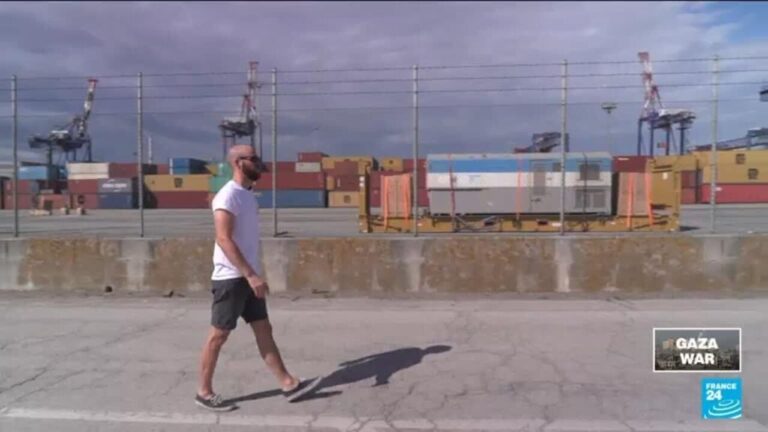Italian dockworkers have initiated a blockade on ships destined for Israel, intensifying tensions surrounding the ongoing Gaza flotilla controversy. The protest, rooted in solidarity with Palestinians in Gaza, has disrupted maritime traffic at key Italian ports, drawing attention to the broader geopolitical conflict in the Middle East. This development underscores the increasing involvement of international labor groups in regional disputes and highlights growing opposition to Israeli policies in the Gaza Strip.
Italian dockworkers halt shipments to Israel in show of solidarity with Gaza
Italian dockworkers at the Port of Genoa have initiated a strike, effectively halting the loading and unloading of ships destined for Israel. The move comes as a direct act of solidarity with the people of Gaza amidst ongoing regional tensions exacerbated by renewed clashes and blockades. Dockworkers’ unions emphasized their commitment to humanitarian principles, urging the international community to reconsider policies that contribute to civilian suffering in the conflict zone.
The work stoppage highlights growing dissent within European labor groups concerning the maritime routes supporting Israel’s logistics network. By blocking shipments, the dockworkers aim to draw attention to the escalating humanitarian crisis and press for an immediate ceasefire. Here is a brief overview of the key impacted ports and timeline:
| Port | Action | Duration |
|---|---|---|
| Genoa | Full strike on Israel-bound shipments | Indefinite |
| Livorno | Partial work stoppage, symbolic protests | 48 hours |
| Naples | Supportive rally, delayed cargo clearance | 24 hours |
- Union demands: Immediate ceasefire and humanitarian access to Gaza.
- International response: Mixed reactions with calls for mediation.
- Impact: Potential disruptions in Middle East supply chains.
Impact of the blockade on Mediterranean trade and regional diplomacy
The ongoing blockade has significantly disrupted Mediterranean trade routes, creating ripple effects that extend far beyond the immediate geopolitical tensions. Shipping schedules have been delayed, with cargo ships rerouted or halted, impacting not only Israeli-bound goods but also regional commerce. Ports in countries like Italy, Greece, and Turkey have reported a measurable decline in throughput, compounding economic strains among maritime workers and traders alike. The suspension of certain shipping lines has forced companies to explore alternate logistics channels, often at increased costs and transit times.
- Delays in delivery have affected perishable goods and manufacturing supply chains.
- Heightened security inspections at ports have further slowed cargo movement.
- Insurance premiums for vessels in the region have surged due to instability.
Diplomatically, the blockade has become a flashpoint for regional alliances and tensions, with Mediterranean nations navigating a complex balance of solidarity, economic interests, and international pressures. Italy’s dockworkers’ decisions to halt Israel-bound shipments underscore how grassroots actions can influence national policies and diplomatic relations. These events have sparked vigorous debates within the European Union about the bloc’s stance toward the Israeli-Palestinian conflict, testing the coherence of its foreign policy. Meanwhile, key neighbors continue to engage in mediated dialogues aimed at de-escalation, seeking to restore the free flow of goods essential for regional stability.
| Country | Trade Volume Decline (%) | Diplomatic Response |
|---|---|---|
| Italy | 12 | Calls for EU mediation |
| Greece | 9 | Support for humanitarian corridors |
| Turkey | 15 | Condemnation of blockade |
Calls for dialogue and peaceful resolution amid escalating tensions
As tensions continue to escalate in the region, key stakeholders and international figures are urging all parties to engage in constructive dialogue to prevent further violence. The calls emphasize the need for respect, mutual understanding, and adherence to international law to secure a peaceful path forward. Many voices highlight how sustained communication channels can defuse conflict, restore trust, and pave the way for humanitarian relief efforts. Diplomatic initiatives and backchannel discussions are reportedly intensifying behind the scenes, aiming to de-escalate the situation before it spirals further out of control.
Civil society groups and labor unions, including the Italian dockworkers who staged the recent blockade, underscore the power of solidarity and nonviolent protest in influencing policy decisions. Their actions symbolize a broader demand for accountability and emphasize the need for negotiation over confrontation. Key demands being raised include:
- Immediate cessation of hostilities
- Unhindered humanitarian access to affected areas
- Dialogue platforms inclusive of all stakeholders
- Respect for human rights and international humanitarian principles
In this critical moment, the international community’s response will be instrumental in shaping the course toward potential reconciliation or further division.
| Actor | Position | Proposed Action |
|---|---|---|
| Italian Dockworkers | Nonviolent protest | Ship blockade |
| International Diplomats | Facilitation | Peace talks |
| Human Rights Groups | Advocacy | Humanitarian corridors |
To Wrap It Up
The ongoing blockade by Italian dockworkers highlights the growing international solidarity movements responding to the conflict in Gaza, further complicating maritime operations in the Mediterranean. As tensions continue to escalate, the situation underscores the broader geopolitical challenges surrounding the Israeli-Palestinian conflict and its repercussions beyond the immediate region. Stakeholders and observers alike will be closely monitoring how these protests and disruptions evolve in the coming days.




